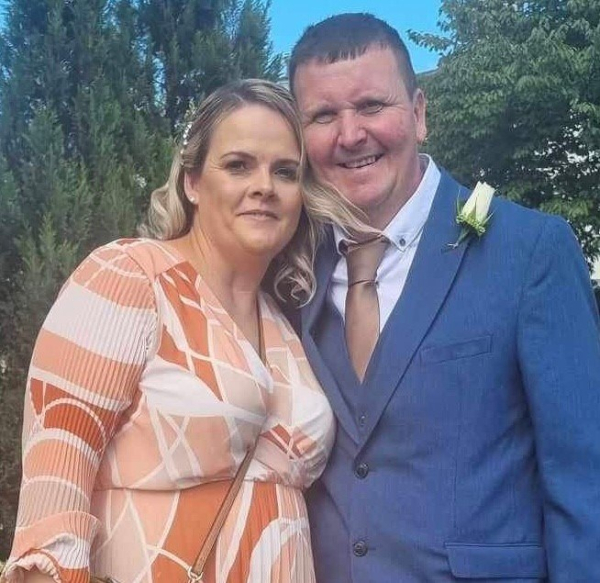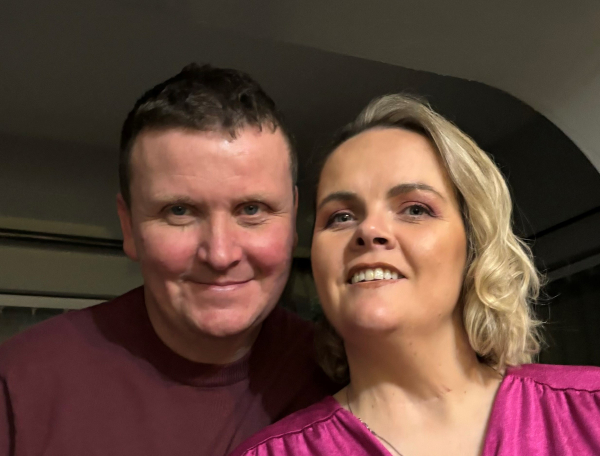
Sharon, 45, from Newry, was given her heart failure diagnosis two years ago and it was the culmination of a lengthy battle to discover what was causing her health problems. Sharon recalls; “It all started in 2021. I was having difficulty with breathing and didn’t know why. I had started my studies to be a social worker and people pointed out my breathlessness, but me being me, I just thought I was doing too much. I was always on the go and loved being busy. That Christmas I developed Covid symptoms but didn’t realise there were deeper issues going on. I rushed to get back to normal as I was starting my social work placement and tried to just get on with things and push through.”
“I lost my mother-in-law in April 2022, and I was arranging her funeral when I went to my GP Practice Nurse for something routine. The nurse noted my breathing and was concerned. A doctor assessed me and that led to me being blue-lighted to hospital. I have asthma and they thought it was something to do with that, so I was given asthma treatment and was discharged later that day to prepare for the funeral.”
“The following week I was sent back to hospital as I was still struggling to breathe. I was admitted overnight, and again I was treated for my asthma and sent home. I went back to my GP a week or two later and told her I was getting no better and was struggling with everything, even walking to the bathroom was an ordeal. She decided to screen for clots, and when the results came back, I was sent straight to A&E for a CT scan. This showed I had ten clots between both my lungs which was a complete shock. I started treatment and thought I would see big improvements, but I found I was still struggling, my breathing wasn't getting better, and I was experiencing chest pain. I was referred to the Chest Pain Clinic and was being treated for angina whilst waiting for a CT scan of my heart. Fast forward to the September 2022 and I was finding things were getting no better, I was fatigued and struggling to do simple things such as dressing. I was unable to work and needed to take time off from my degree. I went back to my GP with the chest pain, and she sent me to the hospital, concerned I had unstable angina. I was admitted to Coronary Care Ward for further testing and following an echocardiogram was told I was in heart failure.”
Sharon continues; “The doctor said to me, ‘heart failure isn’t the death sentence it used to be’, but that just made me think it must be a death sentence. I was very frightened, and my world felt lonely. I was left thinking, ‘why has this happened to me?’. I had so many questions as to why because I don't smoke, I'm not a big drinker, there was no obvious reason for it, and still, nobody can give me a reason. I started Googling heart failure and learnt it is a life-limiting condition. The website I was on gave a prognosis of five years and I was thinking, ‘how do I prepare my family? How do I do this?’. I have four children, and they and my husband were really frightened about what might happen to me. The way I was told I had heart failure didn’t give me more information about the condition, what treatment plans might look like and so on and that could have been dealt with a lot better.”
“In terms of treatment, I was put on medication when I was in hospital. I was at what they call the optimal dosage, but things have been up and down with my medication because of other bouts of illness which has meant things have had to be changed. It has been a bumpy road trying to get to a stable place with my medication which has been unsettling too. Even now I’m still not there and things are changing.”
“I also went to Cardiac Rehab and that helped as I learnt what my limits are. Not all heart failure patients get this however, it depends on what Health Trust they are in, and that just isn’t fair as cardiac rehab is so important for managing heart failure. I hope that will change.”
Sharon battles extreme fatigue on a constant basis because of her heart failure and this has had an enormous impact on her day-to-day life as she explains; “Nobody realises what true fatigue is like unless they have something like heart failure. I had experienced exhaustion before, but this is hitting walls that you just can’t get over and people do not understand.”
“Most days I am in my bed at 6.30/7pm as I have no energy by then. I am in bed before my children. I can't give anything more at that stage and it's awful because my husband comes home from work and we're not getting any time together. I'm so lucky that I have such a good husband, and he completely understands but I feel frustrated for him.”

“I am going into the third year of my degree after I had to take time out during my second year because of my heart failure. I have to provide evidence I have the condition just so a placement closer to home can be considered for me. Working, studying, and traveling five days a week is exhausting, and people just don't understand the impact heart failure has on the body. My body works so much harder, I’m out of breath after what seem simple tasks, and that is very hard and frustrating.”
“My daughter has asked me why I don’t give up working and studying but I’m not ready to give up. I am still young. The reason I'm continuing my social work studies is because I can't do my current job anymore. I work in supported living for people with learning disabilities and physically I'm not able to do it. I've been pushing on with my studies because I need this, it is something I’ve wanted for years. One of my prayers is for me to be able to finish my studies so that when I do leave this world, I can say that I have given it everything. I’m not thinking morbidly but I just don't want to have regrets, that is really important to me. I keep focussing on graduation and the hope that down the line I will be able to help people going through something like what I am.”
Sharon continues; “I don't want to lose who I am just because I have heart failure. I can't let heart failure win; it’s not going to beat me. Being determined is probably a good thing for dealing with heart failure but at the same time it is hard for me to go slower and easier and take time to rest and recharge. I am not that kind of person. My doctors have said to me, ‘many people who have been where you are would have given up Sharon, but you just keep going’. That’s my mantra; keep going. Stopping isn’t who I am.”
“Fatigue isn’t the only side effect I suffer from. I also experience a lot of pain in my legs, joints, and toes. I'm constantly freezing. I have brain fog and forgetfulness because of the fatigue. I've had to move to sleeping downstairs and on the days I'm really tired I have to use a shower chair.”
“I am only in my forties. Never in my wildest dreams did I think this would happen to me. It’s a real battle but I still need to get up every day, sort the children, get to work, and I think that’s the best thing for anyone with heart failure, to still have a purpose. You need to find something that will make you get up in the morning because you could just give up but it's important not to. You need to find your own level of ability and still find happiness.”
Like Amy, Sharon is supporting Northern Ireland Chest Heart & Stroke’s heart failure campaign to spread awareness of the condition and its signs. “I had no clue about the signs of heart failure. I also think because I was being treated for asthma and clots initially, nobody thought to look at my heart and I wonder if that had of happened earlier if things might be different. It is important for medical professionals to be more aware of heart failure as well as the public. There isn’t enough information about heart failure, and I think what NICHS are doing with their campaign is great. Spreading awareness of the signs and symptoms, educating people, hopefully getting people diagnosed as early as possible so they have the best possible outcomes. Also educating people that it is something that can be lived with and it’s not a condition that only affects older people.”
The impact of her diagnosis has been massive for Sharon but also for her family as she explains; “It has been so hard for my children and family. My youngest child is 8 and when I told him about my heart failure he said, ‘but Mummy, you're not going to die, are you?’. That was heartbreaking.”
“The whole family goes into turmoil after a heart failure diagnosis and sometimes we feel like we’re drowning, and we don’t know where to turn. The support available to families needs to change for the good of the mental health of everyone. When people have a cancer diagnosis for example, there is much more support around talking to people about it and dealing with things as a family but there is nothing like that for heart failure and it can have worse outcomes than many cancers.”
Sharon concludes; “Everything has changed for me because of this condition, and it is frightening. There are times when my breathlessness or palpitations are so bad I ask myself, ‘will I see my 50th birthday?’, and that's awful. That fear has made me slow down, however. I am going to be a grandmother for the first time soon and I want to be here for my grandchild and to see my children grow up. I want to be able to have that time. It’s not that I want to slow down, it’s now a necessity to slow down.”
“The biggest thing that I’ve learnt from this is life is short and that we need to make time for the important stuff. For me it’s all about making memories now and I want the children to remember the good times. For example, we have never had a family holiday and next year we are determined to have one.”
“I grieve for the person I used to be, for the work I used to do but my family keeps me going. That helps me deal with this new life, but accepting this is the new life is the hardest part. I think anybody who is diagnosed with a serious condition goes through a stage of grief. We are still alive, but we are grieving for what life should have been. I’ve just had to learn to keep getting back up when I’ve been knocked down; and I will keep getting back up.”
Find out more about heart failure and how we can support you and your family.
